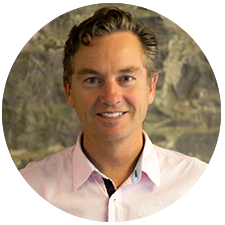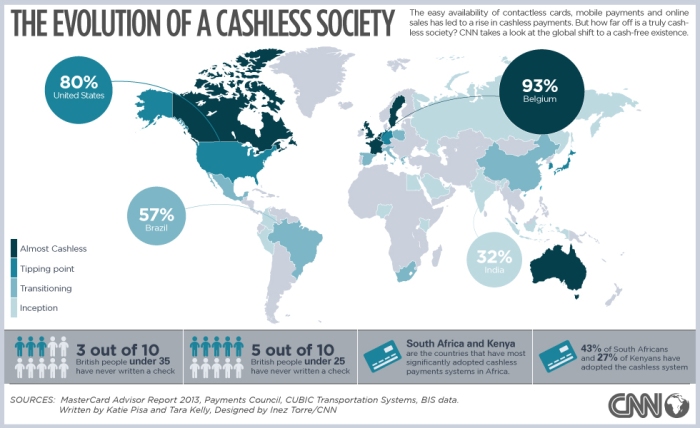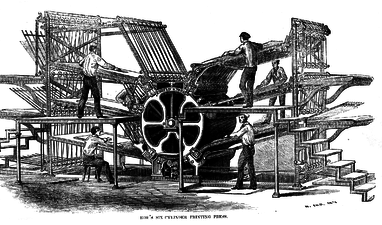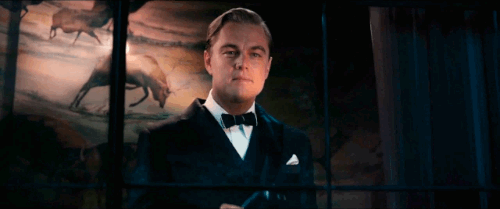On Tuesday the 11th of April our third and last mini conference #getdigital took place in the Helix of the Dublin City University. It has already been the seventh #getdigital conference, hosted by the DCU Business school in cooperation with IC4, DCU Ryan Academy and DCU Alpha.

In the last two conferences I´ve already learned plenty of interesting things about how to successfully master the challenges I could face when starting my own business (#getstarted) and the importance of social media in our connected world (#getsocial).
Our last conferences focused on the meaningful and contentious topic of the digital future.
My generation has already experienced a lot of significant changes in terms of technology over the last years, so one might think our world is as advanced as it can get.

On the contrary, in today´s conferences we´ve learned that the best (or not?) is yet to come in the field of technology, machinery and digitalization.
But how is it possible to make the world even more „digital“ when we already live in a world full of advanced technology where digital is the new normal? This is one of the many questions I was asking myself, since the pace of digital innovation has become enormous which makes it extremely hard to follow.
When thinking about my future in terms of the job market, I have to be aware of what this future might look like.
That´s why I was looking forward to this conference hoping to get some insights into the digital future and the consequences these changes might bring along.

Revolutionizing the current health care system: Dr. Johnny Walker

Our first guest speaker was Dr. Johhny Walker, the CEO and founder of health founders. Walker is a clinically active Interventional Radiologist & Nuclear Physician and International Medical Entrepreneur. Together with a team of like-minded thinkers, the Australian has made it his task to transform the future of our current healthcare system for the better.
Our health care ecosystem is mainly hospital-based doctor-focused which makes it not only unsafe and unsustainable, but also very costly. This perception is in accordance with Dr. Andrew Weil how says „We are all suffering from a broken health care system and medicine that is too dependent on expensive technology and pharmaceutical drugs that often cause as much harm as benefit“. Walker intends to create a better way of delivering health care to the patients.

– Solution: Promote Health & Wellness within the community –

 How?
How?
- Extend the current primary care models
- Enable technologies to create personalized innovations
– Result –
A massive paradigm shift —> With the technologies the whole system moves away from the hospitals to our own homes.

In 92% of all cases the female is the custodian of wellbeing of the family – the gatekeeper or as Walker calls her the „Jinga“. Nevertheless, very often her voice is not heard due to a lack of meaningful personalized information so that it´s a big challenge for her to juggle it all.
– Solution –
Bring together technologies (IT, Workflow, sensors) designed by the gatekeeper of the family which allows her to access her family`s health information—> Cloud based, personalised, secure, 24/7, anywhere –> Jinga life
 Components of Jinga:
Components of Jinga: 
- Vitals & Biometrics
- e-prescriptions
- personalised electronic health record
In the following he talked about the future mainly focusing on the future of health.
From monitoring babies and chronic disease to smart aging, Walker demonstrated that technology is the only effective way to a healthy future. The current on-demand society takes over the health and pharmacy sector: Zipdrug is the first step to a digital kiosk.

– Turning data into knowledge and knowledge into action is the „magic bullet“ to make a real difference in the future –
-What´s the current status quo of technolog y?-
y?-
- Digital Thermometer
- VR
- e-stethoscope
- digital blood pressure monitoring
- Robots
- 3D printing
- Blockchain
Overall, I was very impressed by Walker´s idea of disrupting the whole healthcare system. When discussing disruption and digitalization, I´ve never given the health sector any thought even though health is the most important aspects of everybody´s life. His idea promotes simplicity and a better care quality for all by simply taking advantage of the advanced technological possibilities.

In his book Dr. Bertalan Mesko describes that „perhaps more than in any other field, technology has transformed medicine and healthcare in ways that a mere decade ago would have sounded like pure science fiction.“ And exactly that´s what Walker´s idea might sound like now – but who knows where we stand in a few years ?
No money no problem? David Erixon
Ou r second guest speaker was David Erixon. The Swede is the Head of Digital and Customer Innovation at Ulster Bank and has a long experience of marketing, innovation,customer experience and digital business transformation. He´s also the founder of Hyper Island. In his speech he focused on the digitalization and future of money and the connected consequences.
r second guest speaker was David Erixon. The Swede is the Head of Digital and Customer Innovation at Ulster Bank and has a long experience of marketing, innovation,customer experience and digital business transformation. He´s also the founder of Hyper Island. In his speech he focused on the digitalization and future of money and the connected consequences.
-On our way to a cashless society?-
What might sound like a bad joke, slowly becomes reality. Not in Ireland but in Sweden, Erixon`s home country, the trend goes towards removing the physical currency.

-
Swedish buses have not taken money for years
-
Retailers are legally entitled to refuse money
-
Cash transactions made up barely 2% of the value of all payments made in Sweden 2015
-
In shops cash is now used for barely 20% of transactions —> global average: 75%
-
More than the half of Swedish bank branches no longer keep cash on hand
Taking into account these impressive facts, Sweden can be regarded as the most progressive nation in the world when it comes to digital money.

The graphic shows that Sweden isn’t the only country on the way to a cashless society. Nevertheless, there´s still many countries where physical money plays a crucial role in almost all transactions.
According to the Global Information Technology Report 2016, Sweden can be seen as a very innovative country: „Businesses are taking advantage of the fact that their consumer base is highly connected, which is reflected in one of the highest rates of B2C interaction globally (4th)“. The fact that Swedes are connected is vital for the implementation of cashless society.
-But why is Sweden abolishing the physical currency?-
According to Bengt Nilervall from the Swedish Federation of Trade, cashless trading is „safer this way and it saves us money, as handling money and transporting cash is costly. The Payment Card Industry [PCI] has taken many security measures to ensure that people are safe and we have good protection in place, so Swedes feel confident paying electronically“.
Sweden´s alternative to cash mainly consists of two things:
- cards are the main form of payment —> Swedes use them more than three times as often as the average European
- Digital payments via phones —> mobile payment app swish and the chip card reader iZettle


-Is everybody happy with this development?-
Most people and also the majority of retailers are happy with a less cash based society.
However, some retailers have raised their concerns in terms of the transaction fees that come with the cards and even the new apps.
Moreover, some of the elderly, less tech-savvy generation aren´t happy as it´s hard to adapt to the incredible pace of the digitalization.
Another big issue is the fear of electronic fraud, which have doubled in the past decade.
As Erixon illustrated in his speech, the importance of banking and mobile payment will rise significantly over the next years. Personally, I still couldn´t imagine living in a completely cashless life, even though I have to admit that most of my transactions are operated by card payments.
I found Erixon`s talk very impressive due to the fact that I wasn`t aware of the highly advanced Swedish society in terms of digital payment. This example illustrates us that what sounds futuristic is definitely a good alternative and has to be taken into consideration for the future.

Erixon compared this development to the health sector and mainly Walker`s presentation: Similar to Walker´s idea (health), the cashless society disrupts the big financial sector leading to a massive „paradigm shift“.He concluded his impressive speech by telling us that it was not interesting to be here, but what we are doing with what he´s talking about.
It´s all about discontinuity: Alistair Croll
The third and la st speaker of this conference was Alistair Croll. In retrospective, I have to say that there couldn’t have been a better speaker to finish off our last ever Dice conference.
st speaker of this conference was Alistair Croll. In retrospective, I have to say that there couldn’t have been a better speaker to finish off our last ever Dice conference.
Being an entrepreneur, author and public speaker for over 20 years, Croll has a very impressive vita. He literally epitomizes the values of the DICE module since he has chaired some of the worlds leading conferences on innovation, startups and technology. Moreover, he´s a visiting executive at Harvard Business School where he teaches data science and critical thinking.
– How do we change a society through innovation? –
I was surprised when Croll started by telling us that technology is not that interesting. What is interesting is discontinuity. Discontinuity ran like a thread through his whole presentation which made it very easy to follow.
when Croll started by telling us that technology is not that interesting. What is interesting is discontinuity. Discontinuity ran like a thread through his whole presentation which made it very easy to follow.
– What triggers discontinuity ? –
He illustrated this with the example of agriculture. Agriculture has been the most important part of everybody’s life for many years —> No-one could have lived without agriculture.

Just like Bindraban and Rabbinge described in their book Global food security, „starting from generation of work and income through agriculture, the sector increasingly broadened its objectives“. Nowadays, the agriculture sector has developed further causing many discontinuities in the world food system. Connected to that is the fact that 75% of people live in urban areas in developed nations these days.
Another important aspect are the unintended consequences of technological innovation. When Johannes Gutenberg invented the printing press in 1440, the whole communication and information sector was revolutionized. This invention was the one of the first steps towards democracy as people were able to spread information through flyers.

This year the iPhone is 10 years old and we people just take it for grante d, even though just 10 years ago there was no messaging and people had to check their mailboxes to get messages.
d, even though just 10 years ago there was no messaging and people had to check their mailboxes to get messages.
– „I can´t imagine a world without a smartphone“ is a discontinuity –
But how is it possible that we as a species are horrible in seeing future things coming ?
Reasons:
- Big changes really sneak up on us
- We tend to optimize the exisiting models —> blockbuster and netflix: Unlike Netflix, blockbuster was waiting for the future to come and didn’t try to accelerate the change.
– How should we look at the future? –
We should look at the future in terms of abundance and scarce and take into account the unintended consequences. Moreover, we live in an attention economy and not an information economy, which is what many people tend to think.
To sum up, I was totally intrigued and engaged during Croll´s whole speech. With his knowledge about the world he didn’t only tell us about what he thinks the future might look like, but he also dated back to the past making the whole process of discontinuity more vivid. His talk encouraged me to always stay open-minded towards new technology as well as watching out for the unintended consequences of innovations.
In my opinion this last conference was one of the best: All three speakers gave us some great insights into how they think the future might look like and I especially liked the last speaker, Alistair Croll.

One year of Dice has come to an end with this last mini conference. Overall, the Dice module was a totally new experience for me and I have to say the learning outcome was enormous. The conferences definitely opened my mind and we got some excellent first-hand information about the important areas of Start-ups, Social media and digital technology. I´m sure the program will help me in my future career mainly due to the fact that through Dice we got some first insights into the real business world and not just theoretical knowledge.
Finally, I can say that I´m glad to have made my experiences with Dice.

Thanks for reading my blog!
Now it´s your turn, let me know what you think about the conferences after reading all three blogs:
References:
- Devin Thorpe 2016. Dr. Andrew Weil Works To Focus Healthcare System On Health [Online]. Available from: https://www.forbes.com/sites/devinthorpe/2016/01/13/dr-andrew-weil-works-to-focus-healthcare-system-on-health/#69652bb43359 [Accessed 17 April 2017].
- Bertalan Mesko 2017. The guide to the future of medicine [Online]. Available from: https://medicalfuturist.com/wp-content/media/2013/10/the-guide-to-the-future-of-medicine-white-paper.pdf [Accessed 17 April 2017].
- Bindraban S., Rabbinge R. 2012. Megatrends in agriculture – Views for discontinuities in past and future developments [Online]. Available from: http://www.sciencedirect.com/science/article/pii/S2211912412000247 [Accessed 17 April 2017].
- Jon Henley 2016. Sweden leads the race to become cashless society [Online]. Available from: https://www.theguardian.com/business/2016/jun/04/sweden-cashless-society-cards-phone-apps-leading-europe [Accessed 25 April 2017]
- Nathan Heller 2016. Imagining a cashless world [Online]. Available from: http://www.newyorker.com/magazine/2016/10/10/imagining-a-cashless-world [Accessed 25 April 2017].
- Eleazar Corpuz 2016. Sweden is slowly becoming a cashless society [Online]. Available from: https://futurism.com/sweden-is-slowly-becoming-a-cashless-society/ [Accessed 25 April 2017].
Additional readings:
- Baller S., Dutta S., Lanvin B. 2016. The Global Information Technology Report [Online]. Available from: http://www3.weforum.org/docs/GITR2016/WEF_GITR_Full_Report.pdf [Accessed 25 April 2017].
- Karen Taylor Deloitte 2015. Connected Health How digital technology is transforming health and social care [Online]. Available from: https://www2.deloitte.com/content/dam/Deloitte/uk/Documents/life-sciences-health-care/deloitte-uk-connected-health-sm1.pdf [Accessed 25 April 2017].
